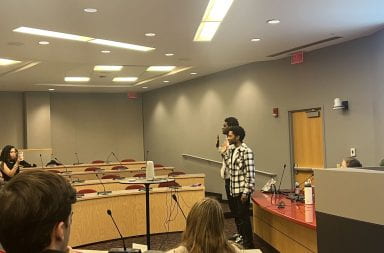It is frightening when major global issues aren’t discussed nearly enough in our generation.
Using the Syrian conflict as an example, there isn’t lack of accessibility to the facts, just a lack of absorbing facts.
While it might seem to only affect the Middle East, Alexander Thompson, associate professor in the Department of Political Science, explained otherwise.
“Western countries want to apply pressure on (Syrian President Bashar al-) Assad. This is difficult because no sanctions or military intervention can be done because of security counsel. The opposition is fragmented and has many elements not palatable to the U.S. and other countries,” Thompson said.
On Saturday, Iran and Syria refused the U.S.’s scheme to remove Assad, according to multiple reports.
Syria shut down the idea, and voiced that Assad plans to continue his term until 2014, when the next presidential election will take place.
The U.S. has been put in a vulnerable state both financially and emotionally due to involvement in other countries’ conflicts.
Getting involved in the Syrian conflict might seem like something U.S. citizens want at the moment, but as was shown in Afghanistan and Iraq, involvement can just lead to more lives lost without the problem being solved.
The problem will only be solved when Syria is at peace.
Having a third party, such as the U.S., use force and other tactics to resolve the issues will only cause more panic and unrest in Syria.
According to the United Nations, since the conflict began in March 2011, 70,000 lives have been lost in Syria.
While the numbers themselves are striking, it’s important to step back and realize the implications the conflict has in our own lives and the lives of fellow students.
Brianna Horn, a second-year international studies and vice president elect of Collegiate Council of World Affairs, said she is saddened by the lack of knowledge about the conflict.
“It’s astonishing how little people know about the conflict. The news of the violence can be really numbing and depressing to follow, since few are optimistic of any sort of viable peace in the near future,” Horn said.
According to Al Jazeera, about half a million Syrians have fled to neighboring countries such as Jordan, Lebanon and Turkey over the course of this almost two-year conflict.
Christopher Gelpi, chair of peace studies and conflict resolution at the Mershon Center for International Security Studies, worries about the strain on other countries.
“Jordan has been in the middle of everything. It’s one of the first places that took refugees from Iraq, and now Syrian refugees. This puts the leadership in a hard position of saying that they can’t take more,” Gelpi said.
Syrian women and children are a prime target to the Syrian violence.
Last week alone, violent attacks in Aleppo and the surrounding region took the lives of more than 140 people, according to Human Rights Movement.
These attacks drastically changed the city layout by destroying buildings and homes.
About 71 children were killed in the violence.
Gelpi, who is also a political science professor at OSU, finds the connection between the violence and causes.
“Damascus and Aleppo have been a battle ground for some time. Having students be a target is not surprising because that’s the age group involved in fighting. The act of killing children is a demonstration to be shocking with violence. To inflict costs that seem extreme,” Gelpi said.
Horn said student deaths are especially worrisome.
“The death of over 80 students last month at Aleppo University really resonates with me. It is absolutely horrifying that such violent acts would be committed at a place where students just like myself deserve a safe environment conducive to learning,” Horn said.
Thompson is concerned about how lengthy the conflict has been.
“There are chances for it to end cleanly, but the chances are diminishing. Assad could step down in Saudi Arabia or other countries that could offer asylum. He could live the rest of his life as a rich man. Now with a civil war, there is nothing clean about it,” Thompson said.
Gelpi said the end isn’t in sight.
“This will play itself out until someone wins,” Gelpi said.


